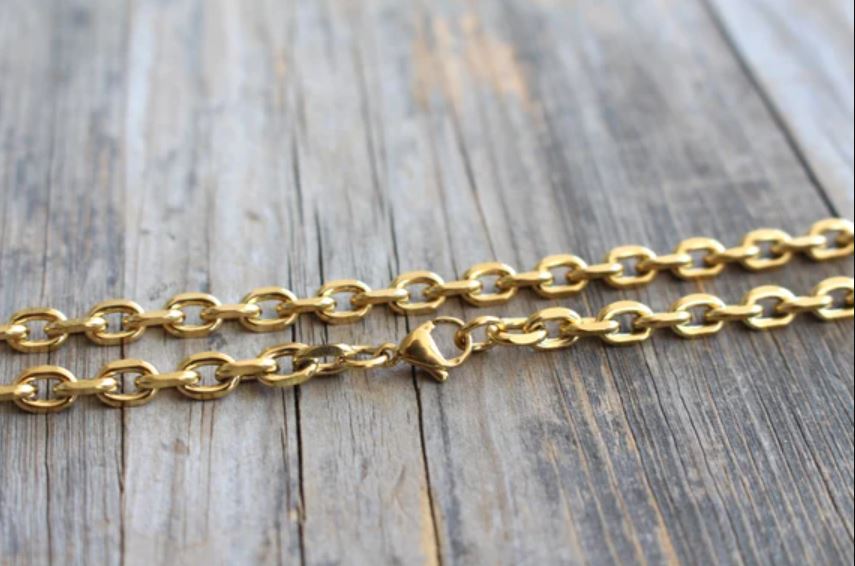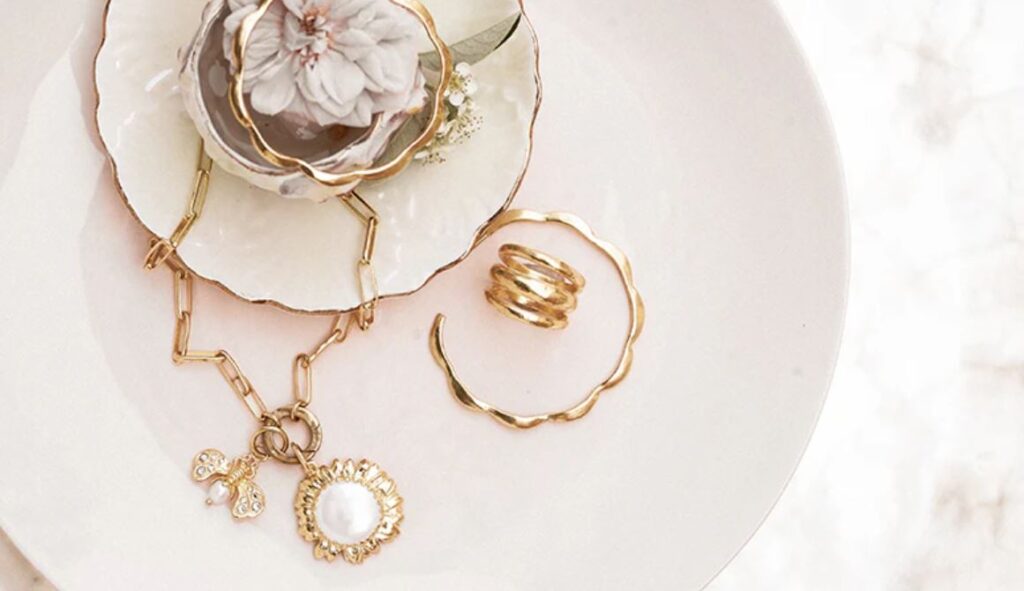Does Gold Plated Stainless Steel Tarnish
No, gold plated stainless steel does not tarnish. Stainless steel is one of those metals which do not tarnish no matter what composition they are made in. Copper is the main cause of tarnishing a metal. If a metal does not contain any amounts of copper, it will not tarnish.
Gold plated stainless steel will not tarnish even if gold plating wears off.
Why It Does not Tarnish
Stainless steel is made by combination of iron and carbon with a thick coating of chromium over it. Main cause of tarnishing is the presence of copper metal. Stainless steel does not have any copper. That’s why gold plated stainless steel does not tarnish.
Metals like silver can tarnish. If gold plating is done over sterling silver rather than stainless steel, then it will tarnish.

Does Gold Plated Stainless Steel Corrode?
No. Gold plated stainless steel does not corrode. Stainless steel is made by combination of iron and carbon with a thick coating of chromium over it. This coating does not allow iron to react with any of the atmospheric gases or chemicals. This protects stainless steel from corrosion. As long as this thick coating is over it, it will not tarnish or corrode.
Is Gold Plated Stainless Steel Hypoallergenic?
Yes. Gold plated stainless steel is hypoallergenic. It will not react with your skin or any other chemicals. You can easily wear it. Even if you sensitive skin, you can wear it as well. All you have to do is to avoid nickel, copper and silver.
Is Gold Plated Stainless Steel Damaged by Water?
Yes, it can be damaged by water. Gold plating on gold plated stainless steel is very thin and can be scratched off by any damages.
You should avoid any tasks that include water when you are wearing jewelry. It includes swimming, showering, washing, laundering or any task that involves water. Best way is to either remove all of your jewelry before doing these tasks or just don’t do it.
Gold plating is also done on other metals like copper, sterling silver or brass. These metals can tarnish.
How Long Does Gold Plating Stay?
Gold plating does not stay for long on stainless steel. If you are a regular user of jewelry, it will start fading is 3 to 4 months. If you don’t wear it regularly then this time can be more.
At last, it depends on how well you take care of your jewelry. If you use it roughly and don’t save it from scratches, it is going to fade way quicker.

Is It Worth It?
Gold plated stainless steel is a good option if you want to buy a gold look alike jewelry item but don’t have a budget. One thing you should note is that gold plated stainless steel is never going to be looked like real gold.
Price difference between the solid gold and gold plated is way too much. For example, a simple rope chain made in gold plated stainless steel costing $50 can cost you more than $1500 in solid gold.
So, if you are one who wants to get gold alike looks at a minimal budget, then go for it. Otherwise, it is not a good option.
What Kind of Gold Plated Stainless Steel Should You Avoid?
Gold plated stainless steel comes in different types of jewelry items like bracelets, necklaces etc. Gold plated items that are chunkier and heavy tend to be appear more fake. Contrary, a bit lighter pieces like normal size chains appear better. So, if you are going to buy a gold plated stainless steel jewelry, don’t buy a heavy one. It will fade quickly and you will have to re-plate it after some time.

How to Take Care of Gold Plated Stainless Steel Jewelry
Taking care of your jewelry properly can increase its life and keep it intact with its shine. Here are some of the tips you can use to take care of gold plated jewelry.
1. Avoid Scratches
Gold plated jewelry of any type can be greatly damaged by scratching. Damages like scuffs and dents can not only impact the shine but also badly impact the overall look. Its better to don’t do any tasks which involve force when you are wearing jewelry.
2. Avoid Chemicals
Keep your gold plated items away from chemicals. These chemicals can be bleach, detergents, washing soap, lotions and perfumes. Either remove the jewelry items before using these chemicals or just don’t use it all together.
3. Avoid Contact with Water
Water can severely damage gold plated jewelry specifically if it is chlorinated or contains salts such as sea water. Avoid washing hands, taking shower, swimming in a swimming pool or beach when wearing jewelry.
4. Proper Storage
Store your gold plated items in a dry, cool place. Use a jewelry box or a soft cloth pouch to protect them from dust and moisture. Avoid storing them in humid areas, such as bathrooms.
5. Save Jewelry from Damages
Jewelry can get damaged by falling on rough surfaces and friction etc. This leads to scratches, scuffs or even cuts which will eventually remove gold plating. As the base metal is exposed to air, it will start tarnishing.
6. Don’t Sleep in Jewelry
People often don’t follow this instruction. If you sleep when you are wearing your jewelry, it will rub with different things. This will bring in scratches. Use a sleep bowl that is specifically used for jewelry items.
Should You Buy Gold Plated Stainless Steel
Gold plated stainless steel is an affordable way of getting gold alike appearance. It does not tarnish or corrode. But it’s gold plating will start to wear off in 3 to 4 months of regular usage. So, if you are buying it, keep it in mind that you will have to spend money on re-plating.
Conclusion
Gold plated stainless steel does not tarnish. You should wear it without any problems. One thing you will frequently have to do is to re-plate it. It will cost you some money and may not be worth as gold plated stainless steel is very low cost. So, it depends on you to either gold plate it or buy a new one.

